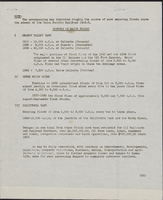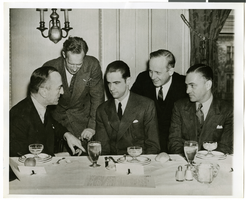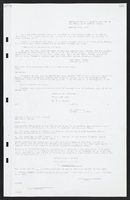Search the Special Collections and Archives Portal
Search Results
Lockwood Cafe, Las Vegas, Nevada, approximately 1945-1950
Level of Description
Archival Collection
Collection Name: L. F. Manis Photograph Collection
Box/Folder: Box 03
Archival Component
Provost's office staff, University of Nevada, Las Vegas, 2004 September
Level of Description
Archival Collection
Collection Name: University of Nevada, Las Vegas Photograph Collection
Box/Folder: Folder 49
Archival Component


History of major floods in Moapa valley and adjacent washes, after 1945
Date
Archival Collection
Description
List of the major floods in the Moapa Valley with map to show locations of the floods.
Text

Transcript of interview with Robert "Bob"Agonia by Marcela Rodriguez-Campo, September 6, 2018
Date
Archival Collection
Description
Robert “Bob” Agonia (1938- ) was born in Garden Grove, California on a migrant camp made up of Filipino and Mexican-American workers. Agonia’s father was a farmer on a 70 acre farm owned by the Beggs family. Agonia did not spend much time living on the migrant camp, as his father moved the family to a private residence when Agonia was four. Agonia attended school, during an era of school desegregation in Garden Grove. He recalls that his mother dealt with segregation during her schooling, being forced to attend a school miles down the road from her home despite living across the street from another school. Agonia recalls his community being very diverse with families sharing Filipino and Mexican-American heritage and his neighbors being Japanese Americans. Agonia participated in a multicultural Boy Scout troop. After high school, Agonia joined the Peace Corps and served in El Salvador. While there, Agonia worked in an agricultural research center in Santa Tecla where he helped local farmers select the proper insecticide for their crops. After the Peace Corps, Agonia had his choice of government jobs, ultimately selecting to work for the Internal Revenue Service. Agonia’s work with the IRS is what eventually brought him from California to Las Vegas. He quickly realized that the type of IRS cases he would be handling in Las Vegas were completely different from the work he was accustomed to in California. One of those unique cases required him to close the doors of a downtown casino. Since moving to Las Vegas, Agonia was critical in establishing a Las Vegas LULAC chapter, an American GI Forum, an EEO council, and the UNLV Engineering school.
Text

Photograph of Powell Commemorative Ceremony, Lake Powell, June 19, 1969
Date
Archival Collection
Description
Image

Photograph of Howard Hughes at a luncheon, March 4, 1937
Date
Archival Collection
Description
Image
Las Vegas skyline from north edge of town, North Las Vegas, Nevada, 2017 June 02
Level of Description
Archival Collection
Collection Name: UNLV University Libraries Photographs of the Development of the Las Vegas Valley, Nevada
Box/Folder: N/A
Archival Component

